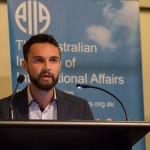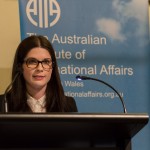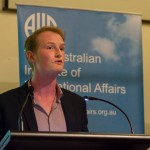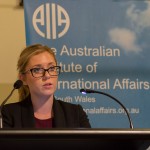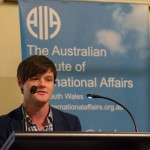An Evening with the interns
On the 31st of May AIIA NSW had our interns present their research to an interested audience at Glover Cottages.
Alexander Galitsky discussed the western influences and factors that have allowed Turkey’s current president to deconstruct Turkey’s parliamentary democratic systems, which had been built on Ataturk’s reforms. Alex notes that despite historical US and EU support and influence in building a Turkish liberal democracy, a lack of intervention on their part gave Erdogan the confidence to become more authoritarian. Alex further noted the crucial strategic position of Turkey both geographically and within NATO as a basis for this lack of interference. Also the need for European nations to cooperate with Turkey due to the current refugee crisis in Europe. Alex noted that the West has become reliant on Turkey as an ally, but the contentious path Turkey was travelling may soon become an issue as Erdogan drives instability within Turkey and the region at large.
Jessica Tattersall discussed whether current provisions in international law are adequate in dealing with both the great destruction to the environment during conflict and the long-term damage to those living in former war zones this causes. She noted that although there are restrictions on the types of weapons used as well as the methods in which war is waged, these are rarely enforced. Further, international tribunals have been unwilling to prosecute offenders – particularly given the difficulty in prosecuting other crimes against humanity, and because of the ambiguous nature of the wording within current laws and provisions. Jessica argued that the system could be strengthened if prosecution for environmental war crime could be held concurrently with those for crimes against humanity and genocide. Useful precedents could be established within ICC courts and records.
Timothy Sullivan discussed “the prospects for a productive relationship between a Hillary Clinton White House and the Israeli political leadership”. He noted that under the Obama administration, relations with Prime Minister Netanyahu had soured, and numerous insults had been hurled. Perhaps the most notorious had been when Netanyahu had recently addressed the US congress without meeting Obama. Tim observed that by contrast Hillary Clinton had spoken in favour of Israel in the recent past, including at an American-Israeli rally in March 2016. Despite this, no substantial policy differences could be detected between Clinton and Obama. Furthermore, while she is publicly considered to be pro-Israel, Mrs Clinton has demonstrated personal support for Obama over Israel. Timothy also noted that there was anecdotal evidence that when she was Secretary of State, Clinton had engaged in very testy phone conversations with Jerusalem. Given that elections are not scheduled in Israel until 2019, Timothy concluded that the relationship is unlikely to improve under a Clinton presidency.
Sophie Utz In her presentation “Traversing contemporary counter terrorism law terrain: from al Qa’eda to Daesh”, Sophie addressed complex issues of international law. She outlined difficulties in pursuing terrorist groups under criminal law, and the interpretive errors frequently made as a result of kaleidoscopic definitions of terrorism within the law. She observed that current counter terror laws are not particularly appropriate when applied to the forces of Da’esh. Many laws were designed to prosecute Al’Qaeda, but Da’esh operated much more as a nation-state. Unlike Al’Qaeda they had physical locations and systems of governance. It was also a much larger entity less regulated internally. Sophie argued that in addition, international armed conflict laws are not appropriately drafted to deal with new international terrorist organisations because terrorists are not considered combatants and thus military force cannot be conventionally employed against them. Sophie added laws for dealing with terrorism in the digital space are lacking.
Declan Molloy discussed “The Trump Card”. He suggested that it was inappropriate to demonise Trump supporters or dismiss them as stupid. They had legitimate grievances about where US politics were heading. The majority of US voters are concerned with an under-performing economy, and the American middle class felt that they were losing their country. Declan observed that in real terms wages have dropped since 1974, and net worth has dropped for every social stratum except for the rich, where it has grown by 75%. Additionally, 47% of Americans could not come up with funds to handle emergencies without borrowing or selling. Set against the backdrop of globalisation and the loss of domestic manufacturing, many Americans feel alienated and deeply suspicious of the bureaucrats in Washington. The bailouts of banks in 2008 had caused further resentment and a sense that America has changed, with 72% of Republican voters no longer identifying with their country. The Republican establishment had seemingly abandoned its core voting bloc, and white non-college educated males in particular favoured other parties. Declan also argued that Trump was willing to undermine democratic norms with his impulsive authoritarian streak, and that his supporters want a revolution in the entire political system.
Report by Edward Durie.
